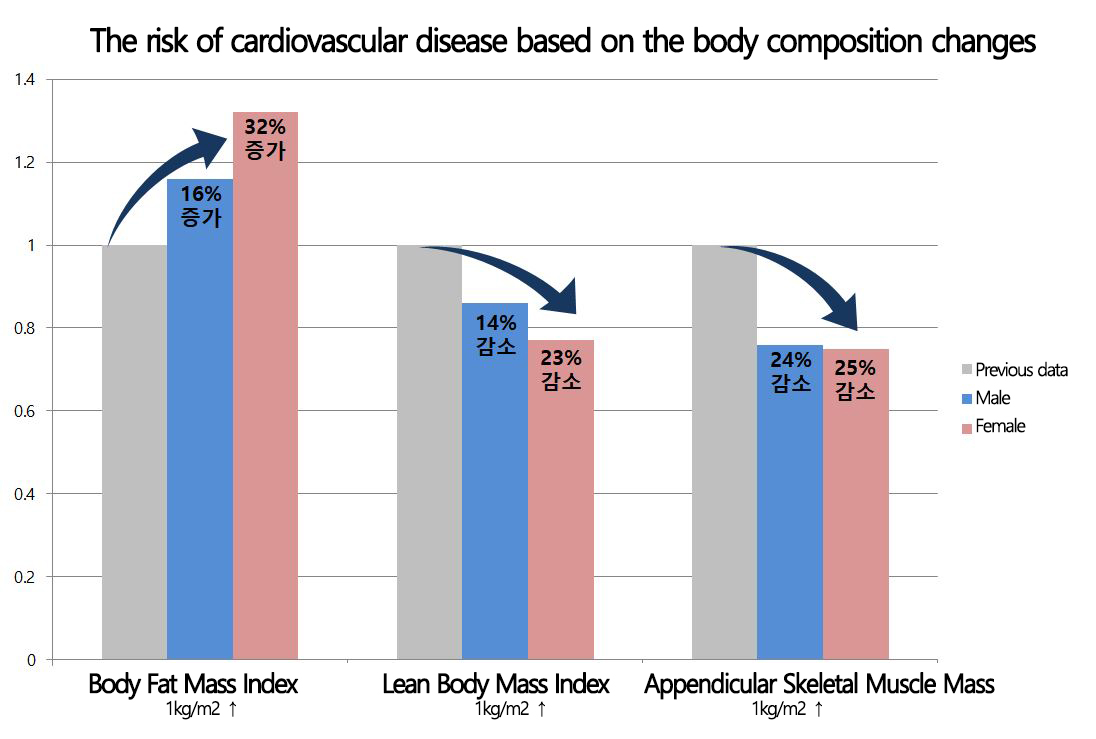To lower the risk of cardiovascular diseases, you should decrease body fat mass and increase muscle mass
Hit : 2,439
Date : 2022-09-26
- SNUH reveals the effect of changes in fat mass and muscle mass on the occurrence of cardiovascular disease
- The first study to determine the association between fat mass and muscle mass in relation to cardiovascular disease
According to a cohort study conducted by a Korean research team, an increase in muscle mass or a decrease in body fat lowered the risk of cardiovascular disease, and conversely, a decrease in muscle mass or an increase in body fat increased the risk of cardiovascular disease. This is expected to be a clear basis for explaining the correlation between weight loss and the incidence of cardiovascular disease.
Previous large cohort studies have not shown the actual health benefits of losing weight in obese people. This is because it was not clear whether the effect of weight loss was intentional or an unintended decrease in muscle mass.
On February 17th, Family Medicine Department Prof Park Sang Min's team (former Professor Lee Gyeongsil, Dr Kim Seong Rae from the Dermatology department) published the results of a cohort analysis on the association between body composition changes and cardiovascular disease using big data from the National Health Insurance Corporation to measure body fat and muscle mass for 3,727,738 adults aged 20-39 over about 6 years from 2013 to 2018.
The research team developed a predictive formula for body fat mass and muscle mass and calculated ▲ body fat mass index (BFMI), ▲ lean body mass index (LBMI), and ▲ appendicular skeletal muscle mass (ASMI). Then, the changes in these indexes of each individual over two years were investigated. Each index is a value calculated by dividing body fat mass and muscle mass by the square of height. The change in body composition was set as an independent variable, and cardiovascular disease that occurred during the 6-year follow-up period was considered as an outcome variable.
As a result of the study, a total of 23,344 cardiovascular diseases occurred. For every 1 kg/m2 increase in B FMI, the risk of cardiovascular disease increased by 16% in men and 32% in women. Meanwhile, for each 1 kg/m2 increase in LBMI and ASMI, the risk of cardiovascular disease decreased by respectively 14% and 24% in men and 23% and 25% in women.

[Figure] When BFMI increased by 1kg/㎡, the risk of cardiovascular disease increased by 16% and 32% for men and women, respectively. Conversely, when LBMI and ASMI were increased by 1kg/㎡, the risk of cardiovascular disease decreased by 14% and 24% in men and 23% and 25% in women, respectively.
Notably, significant results were obtained even in the group with no weight change. Even if there was no change in body weight, an increase in body fat was associated with a higher risk of cardiovascular disease. On the other hand, increased muscle mass was associated with a lower risk of cardiovascular disease.
This study is significant in that it is the first study to identify the association between changes in body fat mass and muscle mass and cardiovascular disease. The reason that changes in body mass index or body weight were not used is because it is difficult to distinguish the effects of each body composition on health benefits because the two variables that go into these measurements are the sum of fat and muscle, and do not distinguish between them.
Research shows that reducing fat and increasing muscle mass through a healthy diet or regular exercise may help young adults reduce the risk of cardiovascular disease.
Professor Park Sang Min emphasized, "Maintaining a normal weight is the most beneficial to health, and it is important to increase the proportion of muscle mass in body composition through steady exercise."
Furthermore, Director Lee Gyeongsil (Esther Formula Medical Food R&D Center) said, “if you go on a diet or fast without exercise, then you will only lose muscle and increase proportional body fat which will make it likely for you to experience a Yo-Yo effect" and "Even if the weight loss effect is slower than some exclusively dieting practices, you can prevent a major illness in the future if you exercise in parallel with a good diet."
This research was published in Journal of Cachexia, Sarcopenia and Muscle, Feb 2022.

[Picture, from left] SNUH Prof Park Sang Min (Dept of Family Medicine), Former Prof Lee Gyeongsil, and Dr Kim Seong Rae (Dept of Dermatology, Clinical fellow)